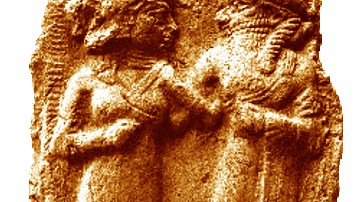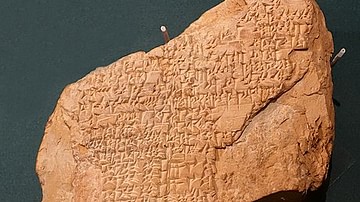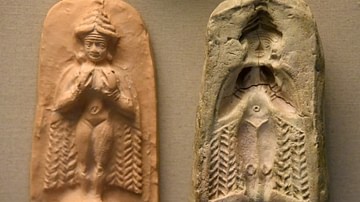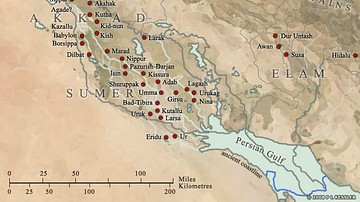The Death of Ur-Nammu is a Sumerian lament over the passing of the king Ur-Nammu (r. 2047-2030 BCE), founder of the Third Dynasty of Ur, who was killed in battle fighting the Gutians in 2030 BCE. The poem is frequently cited for its depiction of a great banquet in the underworld, usually described as dark and silent.
Even so, the image of the realm of the afterlife is still far from pleasant as, "the food of the underworld is bitter, the water of the underworld is brackish" (lines 83-84; Black, 59) and the soul is aware of what has been lost and the grief of those left behind on earth but can do nothing to change its fate or comfort the mourners. The soul is completely self-aware and completely powerless once it has descended to the realm of Ereshkigal, Queen of the Dead, and this understanding of the afterlife contributed, in part, to the belief in ghosts in ancient Mesopotamia: some souls, in trying to assert their autonomy, would escape and return to the world of the living.
The poem, also known as The Death of Ur-Namma and The Death of Ur-Nammu and His Descent to the Underworld, dates from the reign of Ur-Nammu's son and successor, Shulgi of Ur (2029-1982 BCE), and may have been performed as part of the funerary rites. Scholar Samuel Noah Kramer notes that many of the details of the funeral in lines 31-42 no doubt reflect actual practices, and a performance of a lament for a fallen king would not have been out of place.
An especially interesting aspect of the piece is the depiction of the gods and Ur-Nammu's charge that he was betrayed by them. He trusted the most powerful of the gods, Anu (An) and Enlil to protect him but, instead, they let him die on the battlefield. His personal protector, the goddess Inanna, seems to have been purposefully sent away on an errand to distract her, and when she returns, she is outraged. There is no reason given for the gods' decision to withdraw their protection from the king who has always faithfully served them, leaving the question of why good people suffer and die unanswered.
Summary
Lines 1-75 describe Ur-Nammu's death and funeral including the gods' reaction in lines 8-14 where Enki, the god of wisdom shuts the door of Eridug (Eridu) and Utu, the sun god refuses to light the day. The city of Ur is given as Urim where the king's body is brought from the battlefield. Lines 76-197 describe his soul's descent to the underworld, the gifts he brings to the gods associated with the afterlife, like the hero Gilgamesh and Nergal, consort of Ereshkigal, and the great banquet held in his honor.
Lines 155-197 give Ur-Nammu's lament for his life and this transitions to Inanna's rage at finding he has passed to the underworld and the gods' reaction in lines 198-233. The poem concludes with praise to the god Ningiszida, a vegetation and underworld deity who was the son of Ninazu, the god of transition to the afterlife and transformation. The last lines, which are fragmentary, are thought to be appealing to Ningiszida to comfort the soul of Ur-Nammu amidst his tears and lamentation.
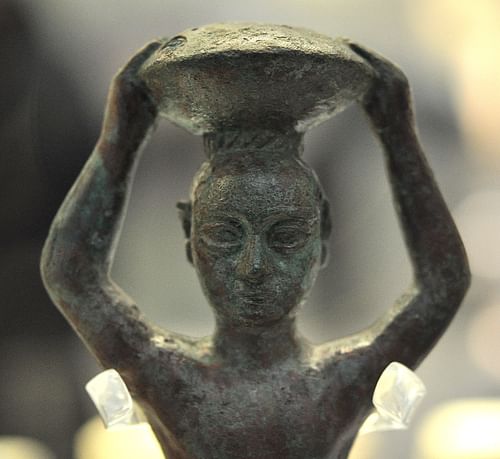
The Text
The following passage is taken from The Literature of Ancient Sumer, translated by Jeremy Black et al. Ellipses indicate missing words or sentences, and question marks suggest the possibility of alternate word choices.
1-7: ... entire land ..., ... struck, the palace was devastated. ... panic spread rapidly among the dwellings of the black-headed people. ... abandoned places ... in Sumer. ... the cities were destroyed in their entirety; the people were seized with panic. Evil came upon Urim and made the trustworthy shepherd pass away. It made Ur-Namma, the trustworthy shepherd, pass away; it made the trustworthy shepherd pass away.
8-14: Because An had altered his holy words completely, ... became empty, and because, deceitfully, Enlil had completely changed the fate he decreed, Ninmah began a lament in her ... Enki shut (?) the great door of Eridug. Nudimmud withdrew into his bedchamber and lay down fasting. At his zenith, Nanna frowned at the ... words of An. Utu did not come forth in the sky, and the day was full of sorrow.
15-21: The mother, miserable because of her son, the mother of the king, holy Ninsun, was crying: "Oh my heart!". Because of the fate decreed for Ur-Namma, because it made the trustworthy shepherd pass away, she was weeping bitterly in the broad square, which is otherwise a place of entertainment. Sweet sleep did not come to the people whose happiness ...; they passed their time in lamentation over the trustworthy shepherd who had been snatched away.
22-30: As the early flood was filling the canals, their canal-inspector was already silenced (?); the mottled barley grown on the arable lands, the life of the land, was inundated. To the farmer, the fertile fields planted (?) by him yielded little. Enkimdu, the lord of levees and ditches, took away the levees and ditches from Urim. (1 line fragmentary) As the intelligence and ...... of the Land were lost, fine food became scarce. The plains did not grow lush grass any more, they grew the grass of mourning. The cows ..., their ... cattle-pen has been destroyed. The calves ... their cows bleated bitterly.
31-51: The wise shepherd ... does not give orders any more. ... in battle and combat. The king, the advocate of Sumer, the ornament of the assembly, Ur-Namma, the advocate of Sumer, the ornament of the assembly, the leader of Sumer, ... lies sick. His hands which used to grasp cannot grasp any more, he lies sick. His feet ... cannot step any more, he lies sick. (1 line fragmentary)The trustworthy shepherd, king, the sword of Sumer, Ur-Namma, the king of the Land, was taken to the ... house. He was taken to Urim; the king of the Land was brought into the ... house. The proud one lay in his palace. Ur-Namma, he who was beloved by the troops, could not raise his neck any more. The wise one ... lay down; silence descended. As he, who was the vigour of the Land, had fallen, the Land became demolished like a mountain; like a cypress forest it was stripped, its appearance changed. As if he were a boxwood tree, they put axes against him in his joyous dwelling place. As if he were a sappy cedar tree, he was uprooted in the palace where he used to sleep (?). His spouse ... resting place; ... was covered by a storm; it embraced it like a wife her sweetheart (?). His appointed time had arrived, and he passed away in his prime.
52-75: His (?) pleasing sacrifices were no longer accepted; they were treated as dirty (?). The Anuna gods refused his gifts. An did not stand by an "It is enough", and he could not complete his (?) days. Because of what Enlil ordered, there was no more rising up; his beloved men lost their wise one. Strangers turned into (?) ... How iniquitously Ur-Namma was abandoned, like a broken jar! His ... with grandeur like (?) thick clouds (?). He does not ... any more, and he does not reach out for ... "... Ur-Namma, alas, what is it to me?" Ur-Namma, the son of Ninsun, was brought to Arali, the ... of the Land, in his prime. The soldiers accompanying the king shed tears: their boat [i.e. Ur-Namma] was sunk in a land as foreign to them as Dilmun. ... was cut. It was stripped of the oars, punting poles and rudder which it had. ...; its bolt was broken off. ... was put aside; it stood (?) in saltpetre. His donkeys were to be found with the king; they were buried with him. His donkeys were to be found with Ur-Namma; they were buried with him. As he crossed over the ... of the Land, the Land was deprived of its ornament. The journey to the nether world is a desolate route. Because of the king, the chariots were covered over, the roads were thrown into disorder, no one could go up and down on them. Because of Ur-Namma, the chariots were covered over, the roads were thrown into disorder, no one could go up and down on them.
76-87: He presented gifts to the seven chief porters of the nether world. As the famous kings who had died and the dead icib priests, lumah priests, and nindijir priestesses, all chosen by extispicy, announced the king's coming to the people, a tumult arose in the nether world. As they announced Ur-Namma's coming to the people, a tumult arose in the nether world. The king slaughtered numerous bulls and sheep, Ur-Namma seated the people at a huge banquet. The food of the nether world is bitter, the water of the nether world is brackish. The trustworthy shepherd knew well the rites of the nether world, so the king presented the offerings of the nether world, Ur-Namma presented the offerings of the nether world: as many faultless bulls, faultless kids, and fattened sheep as could be brought.
88-91: To Nergal, the Enlil of the nether world, in his palace, the shepherd Ur-Namma offered a mace, a large bow with quiver and arrows, an artfully made ... dagger, and a multi-coloured leather bag for wearing at the hip.
92-96: To Gilgamesh, the king of the nether world, in his palace, the shepherd Ur-Namma offered a spear, a leather bag for a saddle-hook, a heavenly lion-headed imitum mace, a shield resting on the ground, a heroic weapon, and a battle-axe, an implement beloved of Ereshkigal.
97-101: To Ereshkigal, the mother of Ninazu, in her palace, the shepherd Ur-Namma offered a ... which he filled with oil, a cajan bowl of perfect make, a heavy garment, a long-fleeced garment, a queenly pala robe, ... the divine powers of the nether world.
102-105: To Dumuzid, the beloved husband of Inana, in his palace, the shepherd Ur-Namma offered a ... sheep, ..., mountain ..., a lordly golden sceptre, ... a shining hand.
106-109: To Namtar, who decrees all the fates, in his palace, the shepherd Ur-Namma offered perfectly wrought jewellery, a golden ring cast (?) as a ... barge, pure cornelian stone fit to be worn on the breasts of the gods.
110-113: To Hucbisag, the wife of Namtar, in her palace, the shepherd Ur-Namma offered a chest (?) with a lapis-lazuli handle, containing (?) everything that is essential in the underworld, a silver hair clasp adorned with lapis-lazuli, and a comb of womanly fashion.
114-122: To the valiant warrior Ningiszida in his palace, the shepherd Ur-Namma offered a chariot with ... wheels sparkling with gold, ... donkeys, thoroughbreds, ... donkeys with dappled thighs, ..., followed ... by a shepherd and a herdsman. To Dimpimekug who stands by his side, he gave a lapis-lazuli seal hanging from a pin, and a gold and silver toggle-pin with a bison's head.
123-128: To his spouse, Ninazimua, the august scribe, denizen of Arali, in her palace, the shepherd Ur-Namma offered a headdress with the august ear-pieces (?) of a sage, made of alabaster, a ... stylus, the hallmark of the scribe, a surveyor's gleaming line, and the measuring rod ...
129-131: To ..., the great ... of the nether world, he gave
2 lines fragmentary132-144: After the king had presented properly the offerings of the nether world, after Ur-Namma had presented properly the offerings of the nether world, the ... of the underworld, the ..., seated Ur-Namma on a great dais of the nether world and set up a dwelling place for him in the nether world. At the command of Ereshkigal all the soldiers who had been killed by weapons and all the men who had been found guilty were given into the king's hands. Ur-Namma was ..., so with Gilgamesh, his beloved brother, he will issue the judgments of the nether world and render the decisions of the nether world.
145-154: After seven days, ten days had passed, lamenting for Sumer overwhelmed my king, lamenting for Sumer overwhelmed Ur-Namma. My king's heart was full of tears, he ... bitterly that he could not complete the wall of Urim; that he could no longer enjoy the new palace he had built; that he, the shepherd, could no longer ... his household (?); that he could no longer bring pleasure to his wife with his embrace; that he could not bring up his sons on his knees; that he would never see in their prime the beauty of their little sisters who had not yet grown up.
155-165: The trustworthy shepherd ... a heart-rending lament for himself: "I, who have been treated like this, served the gods well, set up chapels for them. I have created evident abundance for the Anuna gods. I have laid treasures on their beds strewn with fresh herbs. Yet no god stood by me and soothed my heart. Because of them, anything that could have been a favourable portent for me was as far away from me as the heavens, the ... What is my reward for my eagerness to serve during the days? My days have been finished for serving them sleeplessly during the night! Now, just as the rain pouring down from heaven cannot turn back, alas, nor can I turn back to brick-built Urim.
166-186: "Alas, my wife has become a widow (?)! She spends the days in tears and bitter laments. My strength has ebbed away ... The hand of fate ... bitterly me, the hero. Like a wild bull ..., I cannot ... Like a mighty bull, ... Like an offshoot ... Like an ass ..., I died. ... my ... wife ... She spends the days in tears and bitter laments. Her kind protective god has left her; her kind protective goddess does not care for her any more. Ninsun no longer rests her august arm firmly on her head. Nanna, lord Acimbabbar, no longer leads (?) her by hand. Enki, the lord of Eridug, does not ... Her ... has been silenced (?), she can no longer answer. She is cast adrift like a boat in a raging storm; the mooring pole has not been strong enough for her. Like a wild ass lured (?) into a perilous pit she has been treated heavy-handedly. Like a lion fallen into a pitfall, a guard has been set up for her. Like a dog kept in a cage, she is silenced. Utu ... does not pay heed to the cries "Oh, my king" overwhelming her.
187-197: My tigi, adab, flute and zamzam songs have been turned into laments because of me. The instruments of the house of music have been propped against the wall. Because I have been made to ... on a heap of soil (?) instead of my throne whose beauty was endless; because I have been made to lie down in the open, desolate steppe instead of my bed, the sleeping place whose ... was endless, alas, my wife and my children are in tears and wailing. My people whom I used to command (?) sing like lamentation and dirge singers because of her (?). While I was so treated, foremost Inana, the warlike lady, was not present at my verdict. Enlil had sent her as a messenger to all the foreign lands concerning very important matters."
198-202: When she had turned her gaze away from there, Inana humbly entered the shining E-kur, she ... at Enlil's fierce brow. (Then Enlil said:) "Great lady of the E-ana, once someone has bowed down, he cannot ... (?) any more; the trustworthy shepherd left E-ana, you cannot see him any more."
203-216: My lady ... among the people ... Then Inana, the fierce storm, the eldest child of Suen, ..., made the heavens tremble, made the earth shake. Inana destroyed cattle-pens, devastated sheepfolds, saying: "I want to hurl insults at An, the king of the gods: Who can change the matter, if Enlil elevates someone? Who can change the import of the august words uttered by An, the king? If there are divine ordinances imposed on the Land, but they are not observed, there will be no abundance at the gods's place of sunrise. My holy jipar, the shrine E-ana, has been barred up like (?) a mountain. If only my shepherd could enter before me in it in his prime – I will not enter it otherwise! If only my strong one could grow for me like grass and herbs in the desert. If only he could hold steady for me like a river boat at its calm mooring." This is how Inana ... a lament over him.
217-233: Lord Ningiszida ... Ur-Namma, my ... who was killed,
(1 line fragmentary Among tears and laments, ... decreed a fate for Ur-Namma: "Ur-Namma ..., your august name will be called upon. From the south to the uplands, ... the holy sceptre. Sumer ... to your palace. The people will admire ... the canals which you have dug, the ... which you have ..., the large and grand arable tracts which you have ..., the reed-beds which you have drained, the wide barley fields which you ..., and the fortresses and settlements which you have ... Ur-Namma, they will call upon ... your name. Lord Nunamnir, surpassing ..., will drive away the evil spirits ..."234-242: After shepherd Ur-Namma ..., Nanna, lord Acimbabbar, ..., Enki, the king of Eridug ... ... devastated sheepfolds ... holy ..., lion born on high ... your city; renders just judgements. ..., lord Ningiszida be praised! My king ... among tears and laments; ... among tears and laments.

